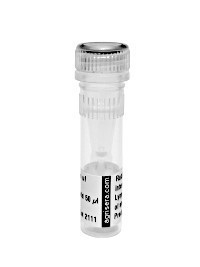1

Anti-RPN1a 26S proteasome regulatory subunit RPN1a
AS19 4264 | Clonality: Polyclonal | Host: Rabbit | Reactivity: Arabidopsis thaliana
- Product Info
-
Immunogen: Recombinant, full-length Arabidopsis thaliana RPN1a protein sequence UniProt: Q9SIV2-1, TAIR: At2g20580 overexpressed in E.coli, purified from a gel piece Host: Rabbit
Clonality: Polyclonal Purity: Serum Format: Lyophilized Quantity: 50 µl Reconstitution: For reconstitution add 50 µl, of sterile water Storage: Store lyophilized/reconstituted at -20°C (short tem, months) or at -80°C (long term, years) ; once reconstituted make aliquots to avoid repeated freeze-thaw cycles. Please remember to spin the tubes briefly prior to opening them to avoid any losses that might occur from material adhering to the cap or sides of the tube. Tested applications: Western blot (WB) Recommended dilution: 1 : 1000 (WB) Expected | apparent MW: 98.1 | 100 kDa - Reactivity
-
Confirmed reactivity: Arabidopsis thaliana Predicted reactivity: Actinidia chinensis var. chinensis, Artemisia annua, Brassica napus, Brassica oleracea var. oleracea, Cajanus cajan, Capsella rubella, Capsicum baccatum, Cephalotus follicularis, Cicer arietinum, Citrus clementina, Corchorus capsularis, Cucumis melo, Cucumis sativus, Eucalyptus grandis, Eutrema salsugineum, Fagus sylvatica, Glycine max, Gossypium raimondii, Helianthus annuus, Jatropha curcas, Lactuca sativa, Lupinus angustifolius, Macleaya cordata, Medicago truncatula, Mucuna pruriens, Nelumbo nucifera, Nicotiana attenuata, Nicotiana sylvestris, Nicotiana tabacum, Noccaea caerulescens, Phaseolus vulgaris, Populus trichocarpa, Prunus persica, Punica granatum, Ricinus communis, Rosa chinensis, Solanum tuberosum, Theobroma cacao, Trifolium pratense, Vitis vinifera
Species of your interest not listed? Contact usNot reactive in: No confirmed exceptions from predicted reactivity are currently known - Background
-
Background: RPN1a (26S proteasome regulatory subunit RPN1a) Acts as a regulatory subunit of the 26 proteasome which is involved in the ATP-dependent degradation of ubiquitinated proteins (By similarity). Required during embryogenesis and involved in innate immune response, proteasome-mediated ubiquitin-dependent protein catabolic process, protein catabolic process, regulation of cell cycle, regulation of protein catabolic process, response to salicylic acid, ubiquitin-dependent protein catabolic process.
Alternative names: 26S proteasome non-ATPase regulatory subunit 2 homolog A, AtRPN1a, 26S proteasome regulatory subunit S2 homolog A. - Product Citations
-
Selected references: Pang et al. (2025). The adaptor protein AP-3β disassembles heat-induced stress granules via 19S regulatory particle in Arabidopsis. Nat Commun. 2025 Feb 27;16(1):2039. doi: 10.1038/s41467-025-57306-7.
Meng, Wang, Hao, et al. (2023) RNA-binding protein MAC5A interacts with the 26S proteasome to regulate DNA damage response in Arabidopsis. Plant Physiol. 2023;191(1):446-462. doi:10.1093/plphys/kiac510
Yang et al. (2004). Purification of the Arabidopsis 26 S proteasome: biochemical and molecular analyses revealed the presence of multiple isoforms. J Biol Chem. 2004 Feb 20;279(8):6401-13. - Protocols
-
Agrisera Western Blot protocol and video tutorials
Protocols to work with plant and algal protein extracts
Oxygenic photosynthesis poster by prof. Govindjee and Dr. Shevela
Z-scheme of photosynthetic electron transport by prof. Govindjee and Dr. Björn and Dr. Shevela - Reviews:
-
This product doesn't have any reviews.



